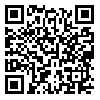Accepted Articles
Back to the articles list |
Back to browse issues page
1- Department of Genomics Research, Digestive Diseases Research Center, Imam Reza Hospital, Ardabil University of Medical Sciences, Ardabil, Iran.
2- Department of Neonatology, Ardabil University of Medical Sciences, Ardabil, Iran.
3- Students Research Committee, Faculty of Medicine, Ardabil University of Medical Sciences, Ardabil, Iran.
4- Department of Genomics Research, Digestive Diseases Research Center, Imam Reza Hospital, Ardabil University of Medical Sciences / Homa Genetic Laboratory, Ardabil, Iran.
2- Department of Neonatology, Ardabil University of Medical Sciences, Ardabil, Iran.
3- Students Research Committee, Faculty of Medicine, Ardabil University of Medical Sciences, Ardabil, Iran.
4- Department of Genomics Research, Digestive Diseases Research Center, Imam Reza Hospital, Ardabil University of Medical Sciences / Homa Genetic Laboratory, Ardabil, Iran.
Abstract:
Background: Growth retardation, distinctive facial dysmorphism, and intellectual disability are hallmark features of Dubowitz syndrome. Pathogenic variants at the NSUN2 and LIG4 genes are related to this syndrome. Case presentation: A male patient, 8 years old, with a clinical diagnosis of Dubowitz syndrome, was referred to the Homa Medical Genetic Laboratory. WES analysis determined a novel nonsense mutation NSUN2(NM_01755.6):c.346C>T(p.Gln116Ter) has been detected as a homozygous genotype. Sanger-based PCR-Sequencing confirmed the finding. Segregation analysis revealed heterozygosity in his unaffected parents and sister, as well as homozygosity for the mutant allele in his mother’s uncle with the same phenotype. Conclusions: About 32 loss-of-function variants were reported to be responsible for Dubowitz syndrome. Being a nonsense variant leading to a truncated protein, not found in the genomic database, and finally, this variant should be categorized as pathogenic based on PVS1, PP4, PP1, and PM2, according to the segregation analysis results.
Type of Study: News and Reports |
Subject:
Cellular and molecular Neuroscience
Received: 2023/08/15 | Accepted: 2024/10/19
Received: 2023/08/15 | Accepted: 2024/10/19
Send email to the article author
| Rights and permissions | |
 |
This work is licensed under a Creative Commons Attribution-NonCommercial 4.0 International License. |







